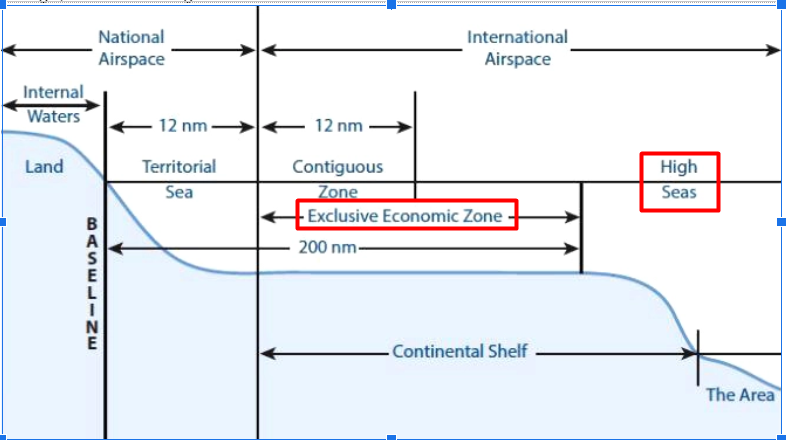Important Facts For Prelims
BBNJ Treaty
- 16 Mar 2024
- 4 min read
Why in News?
The Blue Leaders High-Level Event on Biodiversity Beyond National Jurisdiction took place in Belgium, encouraging nations to ratify the Marine Biodiversity of Areas Beyond National Jurisdiction (BBNJ) treaty aimed at protecting the high seas from pollution, climate change, and overfishing.
What is the BBNJ Treaty?
- About:
- The BBNJ treaty commonly referred to as the Treaty of the High Seas was agreed upon in March 2023 for the conservation and sustainable use of marine biological diversity in areas beyond national jurisdiction.
- It represents a crucial step towards conserving and sustainably managing marine biological diversity in areas beyond national jurisdiction.
- The BBNJ treaty commonly referred to as the Treaty of the High Seas was agreed upon in March 2023 for the conservation and sustainable use of marine biological diversity in areas beyond national jurisdiction.
- Ratification Progress:
- The treaty aims to address the challenges faced by the high seas, which constitute areas beyond 200 nautical miles from the exclusive economic zones of coastal countries.
- So far, 88 countries have signed the treaty, with Chile and Palau being the only two to have ratified it.
- However, at least 60 ratifications are necessary for it to come into force.
- The treaty aims to address the challenges faced by the high seas, which constitute areas beyond 200 nautical miles from the exclusive economic zones of coastal countries.
- Objectives:
- The treaty seeks to increase the percentage of protected areas on the high seas, which currently stands at a mere 1.44%, despite covering more than two-thirds of the global ocean.
- Additionally, it aims to ensure fair and equitable sharing of profits from marine genetic resources (MGR) and establish rules for conducting Environmental Impact Assessments (EIA), which deal with identifying and evaluating the potential impacts an activity could have on the ocean.
- This aligns with the 30x30 target, it is a global commitment to protect at least 30% of the planet for nature by 2030. It was agreed upon at the Convention on Biological Diversity (CBD) at the Conference of Parties (COP15) to the UN Convention on Biological Diversity in 2022 and is included in the Kunming-Montreal Global Biodiversity Framework.
- Challenges:
- Despite widespread support for the treaty, concerns persist regarding potential delays in ratification, echoing past challenges faced by similar international agreements like the United Nations Convention on the Law of the Seas.
- Additionally, operationalising the treaty poses logistical hurdles, including defining procedural frameworks and securing adequate funding.
- Moving Forward:
- Efforts towards the treaty's entry into force and subsequent implementation require concerted global collaboration.
- The upcoming United Nations Ocean Conference in 2025 is identified as a crucial platform for advancing these objectives.
- Efforts towards the treaty's entry into force and subsequent implementation require concerted global collaboration.
UPSC Civil Services Examination, Previous Year Question (PYQ)
Q.1 With reference to the United Nations Convention on the Law of Sea, consider the following statements: (2022)
- A coastal state has the right to establish the breadth of its territorial sea up to a limit not exceeding 12 nautical miles, measured from baseline determined in accordance with the convention.
- Ships of all states, whether coastal or land-locked, enjoy the right of innocent passage through the territorial sea.
- The Exclusive Economic Zone shall not extend beyond 200 nautical miles from the baseline from which the breadth of the territorial sea is measured.
Which of the statements given above are correct?
(a) 1 and 2 only
(b) 2 and 3 only
(c) 1 and 3 only
(d) 1, 2 and 3
Ans: (d)




 Agreement (UN HIGH SEAS Treaty).png)



